Wrocław, the historic city in southwestern Poland, has long been known for its whimsical dwarf statues dotting the streets and squares. These diminutive figures, each with its own unique story, provide a delightful way for visitors to explore the city. By following the Dwarf Trail, travelers can discover Wrocław’s rich cultural heritage and the resilient spirit that these beloved icons represent. From the beer-loving Moczymorda to the University-inspired Papa Dwarf, the tales behind these charming statues offer a captivating glimpse into the city’s past and present. Uncover the secrets that these dwarfs hold, and unlock a new perspective on this vibrant urban landscape.
Key Points
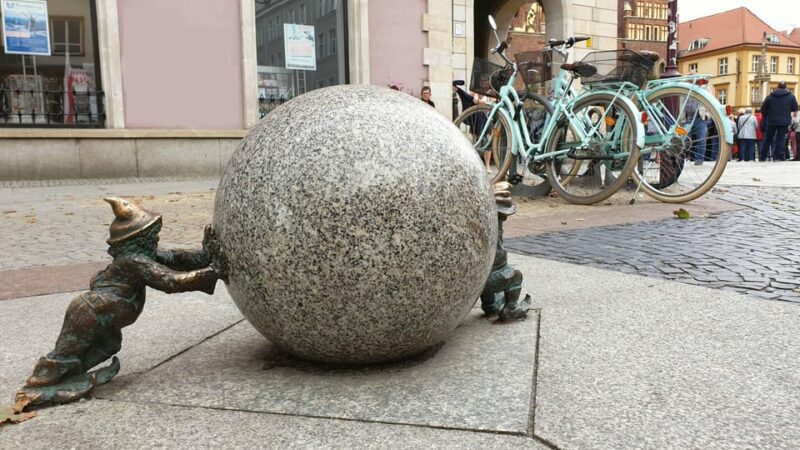
- Discover the quirky dwarf statues scattered throughout Wrocław, which represent the city’s history, culture, and attractions.
- Explore the dwarf trail to uncover hidden gems and historical anecdotes that showcase Wrocław’s resilient spirit during the communist era.
- Learn about the origins of the dwarf statues, which were part of the Orange Alternative protest movement against communist rule.
- Visit key sites like Plac Solny and the University of Wrocław, where notable dwarf statues like the Fencer Dwarf and Papa Dwarf are located.
- Enjoy a guided tour that blends history, humor, and whimsy, providing a unique and engaging way to experience Wrocław’s charm.
Discovering Wrocław’s Dwarf Statues

Wrocław’s dwarf statues dot the city’s streets and squares, inviting visitors on a captivating journey through the town’s rich history and culture.
These whimsical figurines are remnants of the Orange Alternative, an artistic protest movement during communist rule.
Each dwarf represents a significant landmark, event, or personality, offering a unique perspective on Wrocław’s past.
From the mischievous Moczymorda to the scholarly Papa Dwarf, these statues bring the city’s stories to life.
By following the trail of dwarfs, travelers can discover hidden gems, uncover historical anecdotes, and gain a deeper understanding of Wrocław’s resilient spirit.
These diminutive icons have become an integral part of the city’s identity and a must-see attraction for any visitor.
Want to dig deeper into Wroclaw? We've also reviewed these city tours
History and Significance of the Dwarfs
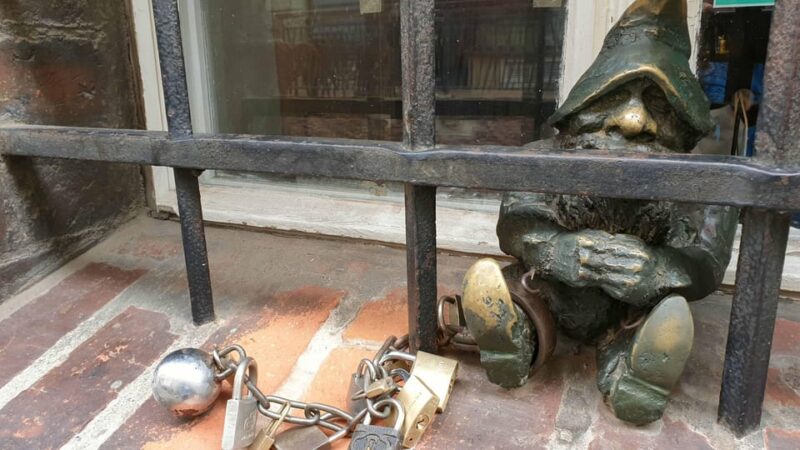
The dwarfs of Wrocław trace their origins to the Orange Alternative, an artistic protest movement that emerged during the communist rule in Poland.
These whimsical figures were created by Major Waldemar Fydrych, an artist and activist, as a humorous form of resistance against the regime.
Each dwarf represents various attractions, monuments, and events throughout the city, serving as a symbol of Wrocław’s history and culture.
The dwarfs were initially seen as an act of defiance, but they’ve since become beloved icons that draw visitors from around the world to discover the city’s unique charm.
Today, they continue to captivate and delight those who follow the dwarf trail, offering a quirky and engaging way to explore Wrocław.
Exploring the Dwarf Trail
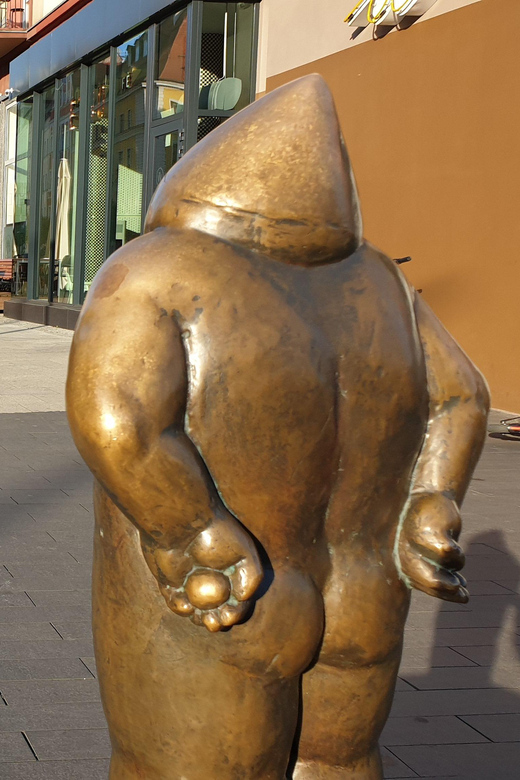
Embarking on the dwarf trail, visitors can enjoy Wrocław’s whimsical charm, encountering the quirky statues that dot the city’s landscape.
These diminutive figures, each representing a unique aspect of the city’s history and culture, serve as guides for a delightful exploration of Wrocław’s hidden gems.
Along the trail, travelers will discover the mischievous Moczymorda, a dwarf symbolizing the city’s rebellious spirit, and the dignified Papa Dwarf, a nod to Wrocław’s academic heritage.
Visiting key sites like the Plac Solny and the Fencer Fountain, the tour offers a captivating look into the city’s past, blending history, humor, and whimsy to create an unforgettable experience.
Notable Dwarf Statues and Their Stories
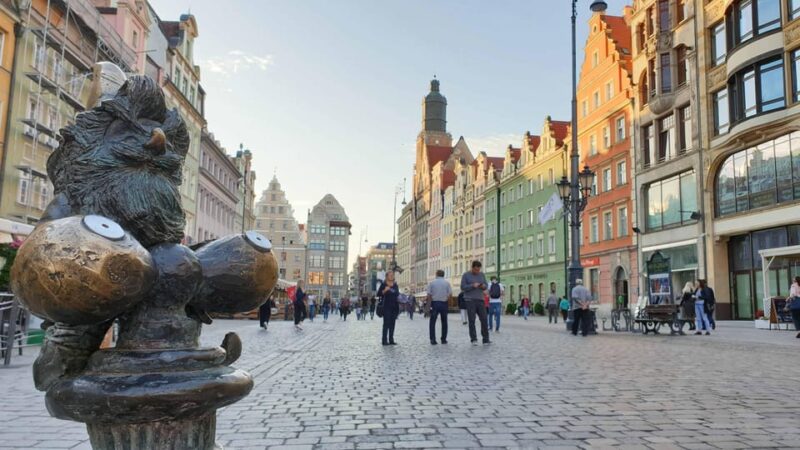
Amidst Wrocław’s dwarf-dotted landscape, each diminutive figure represents a unique slice of the city’s captivating history and culture.
Take Moczymorda, for example – this cheeky fellow, whose name translates to ‘Wet Mouth,’ symbolizes the city’s once-thriving beer culture.
Nearby, Papa Dwarf stands guard over the University of Wrocław, a nod to the institution’s role in shaping the city’s intellectual heritage.
And the Fencer Dwarf, with its sword raised high, commemorates Wrocław’s martial traditions.
Each statue brings to life a different aspect of this vibrant city, inviting visitors to uncover the stories and meanings behind Wrocław’s charming dwarf population.
More Great Thing To Do NearbyKey Sites Along the Dwarf Tour
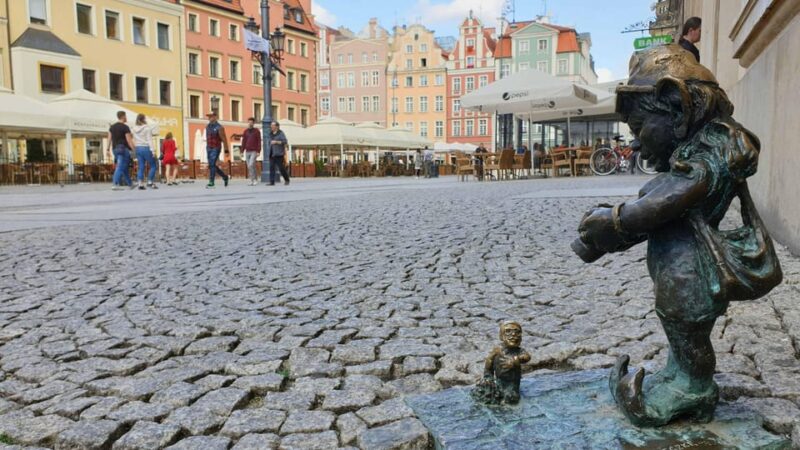
As visitors follow the dwarf trail, they’ll encounter a variety of key sites that showcase Wrocław’s rich history and cultural heritage.
From the bustling Plac Solny, where the Fencer Dwarf stands guard, to the towering University of Wrocław where Papa Dwarf keeps watch, each location offers a unique glimpse into the city’s past and present.
The tour also takes guests to the Fencer Fountain, a beloved landmark where the Moczymorda Dwarf makes his home.
Along the way, the knowledgeable guide shares fascinating stories and historical context, bringing the dwarfs and their significance to life.
Whether it’s admiring the architecture or uncovering hidden details, the dwarf tour provides an enriching and memorable experience.
Here are more great tours and experiences we've reviewed in Wroclaw
Communism and the Orange Alternative
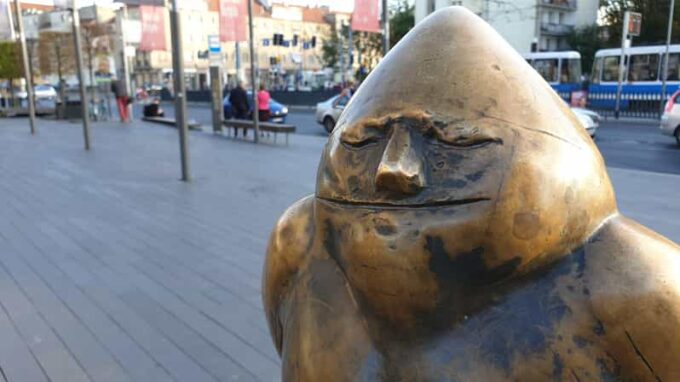
The dwarfs of Wrocław emerged as a symbol of resistance during the communist era, originating from the creative protests of the Orange Alternative movement.
Led by artist and activist Major Waldemar Fydrych, the Orange Alternative used whimsical and humorous tactics to challenge the oppressive communist regime. Their approach included:
-
Organizing ‘happenings’ – spontaneous, absurdist public performances.
-
Adorning the city with dwarf statues as a playful form of civil disobedience.
-
Spreading pro-democracy messages through subversive, satirical slogans.
These dwarfs, now iconic symbols of Wrocław, continue to represent the city’s resilient spirit and its people’s ability to creatively resist oppression.
Customer Feedback and Ratings
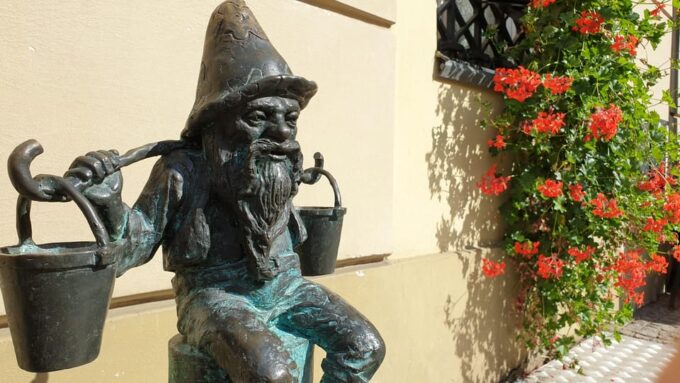
Based on customer feedback, the guided tour of Wrocław’s dwarf statues has garnered an overall rating of 4 out of 5. Reviewers highlight the engaging storytelling and unique perspective it offers on the city’s culture and history.
Participants appreciate the opportunity to discover the hidden meanings and significance behind the whimsical dwarf figurines that dot the cityscape.
The tour’s focus on uncovering the historical context of the dwarfs, which originated as a form of protest during communism, adds an educational and thought-provoking element to the experience.
Booking and Tour Details
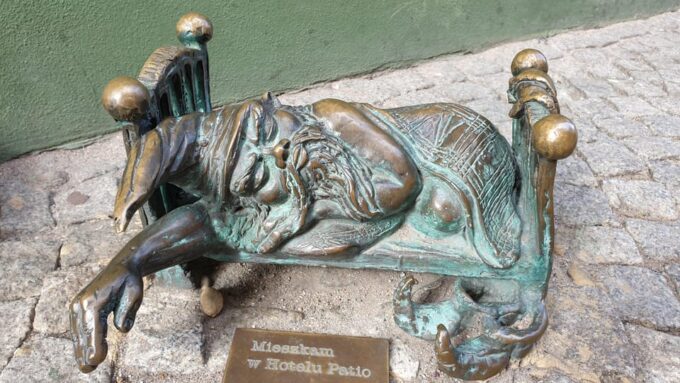
Visitors can book the guided tour of Wrocław’s dwarf statues starting at 871 PLN per person, with flexible booking options that allow them to reserve now and pay later.
The tour offers several convenient features:
-
Wheelchair accessibility and private group options are available.
-
For an additional 5 EUR per person, a dwarf map can be provided upon request.
-
Free cancellation up to 24 hours in advance ensures a full refund if plans change.
With these flexible and inclusive booking details, visitors can easily explore Wrocław’s unique dwarf culture and history through this immersive guided experience.
Frequently Asked Questions
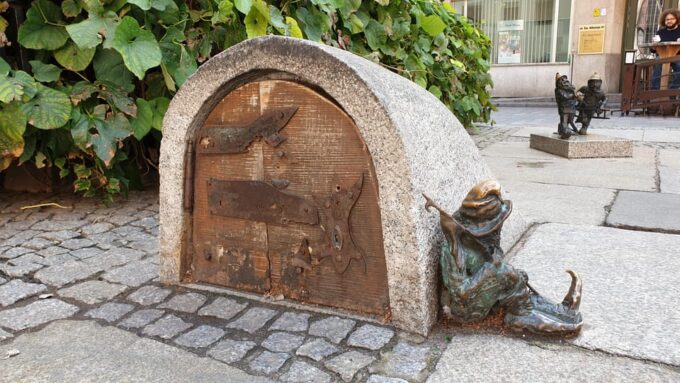
Can I Bring My Pet on the Tour?
Unfortunately, pets are not allowed on the tour. The tour focuses on the city’s dwarf statues and is suitable for adults and children. However, the tour provider can accommodate guests with disabilities, as the tour is wheelchair accessible.
Are There Any Discounts for Students or Seniors?
The tour does not currently offer any discounted pricing for students or seniors. Prices start at 871 PLN per person, with flexible booking and cancellation policies available. Private group options may be considered for special requests.
How Much Space Is Available for Luggage Storage?
The tour does not provide any designated space for luggage storage. Participants are advised to bring only small personal items they can comfortably carry during the 1.5-hour walking tour. Larger bags or suitcases may be difficult to accommodate.
Can I Extend the Tour Duration if Needed?
Yes, you can extend the tour duration if needed. According to the tour overview, the standard duration is 1.5 hours, but the tour provider offers flexibility to accommodate your needs. Simply discuss any desired changes with the guide upon arrival.
What Is the Dress Code for the Tour?
There is no specific dress code for the tour. Participants should wear comfortable walking shoes and clothing appropriate for the weather, as the tour involves exploring the city on foot. The tour is suitable for both casual and formal attire.
Recap
Wrocław’s charming dwarf statues offer a unique way to explore the city’s rich history and vibrant culture.
The guided tour reveals the whimsical stories behind each dwarf, from Moczymorda to Papa Dwarf, while visiting key sites like Plac Solny and the Fencer Fountain.
This engaging two-hour experience provides insights into the city’s resilient spirit, symbolized by these beloved icons.
You can check if your dates are available here:More 2-Hour Experiences in Wroclaw
- Wroclaw Private Tour SHORT and PLEASANT. 2 Hours/1-12 People
- Wrocław: Venice of the North! Monuments on the Odra River 2h
- Wroclaw: 2-Hour Private E-Bus Tour for Small Groups/4 Places
- Wrocław: 2-Hour RETRO E-Bus Tour (For Groups up to 7 People)
- Wrocław: 2 Hour Tour of the Old Town in an Imperial E-Car
- Wrocław: 2-Hour E-Bus Tour With Licensed Guide, 13-15 People
More City Tours in Wroclaw
- Wroclaw Different – Secrets of the City, 2 Hours. 1-9 People
- Wroclaw Grand City Private Tour With Japanise Garden and Panorama Painting
- Dwarf Hunting – Fun City Game in Wroclaw
- Wroclaw to Rock City Adrspach in Czech Republic Private Tour Including Tickets
- Wroclaw: City Tour Sightseeing Golf Cart Old City+Cathedral
- Wroclaw: City Tour Sightseeing By Golf Cart Shared Or Privat
More Tour Reviews in Wroclaw
- Private Transfer Arrival or Departure: Wroclaw – Katowice Airport (Pyrzowice)
- Taste Polish Vodkas With a Local in Wroclaw
- Private Transfer Arrival or Departure: Wroclaw – Opole
- Wroclaw Tour With Electric Bus, 2 H (English Guide) 5-13 People
- Wroclaw to Prague Day Trip
- Private Transfer Arrival or Departure: Wroclaw – Berlin
Not for you? Here's more things to do in Wroclaw we have recnetly reviewed
- 17 Best Cruises And Boat Tours In Wroclaw
- 4 Best Full-Day Tours In Wroclaw
- 4 Best Food Tours In Wroclaw
- 3 Best Private Car With Driver Services In Wroclaw
- Wroclaw: Multimedia Fountain Evening Show
- Private Transfer From Wroclaw (Wro) Airport to Wroclaw City Centre
- Wroclaw to Ksiaz Castle Tour With Private Guide & Transfers
- Wroclaw Tour With E-Bus, 2 H (English Guide) Group 1-4 People.
- Wrocław, City Tour With 5 Entries and a Boat Ride, 5 Hours (Group 1-15 People)
- Wroclaw Outdoor Paintball With Hotel Transfers
- A Yuletide Adventure Through Wroclaw Streets
- Private Transfer Arrival or Departure: Wroclaw – Warsaw
